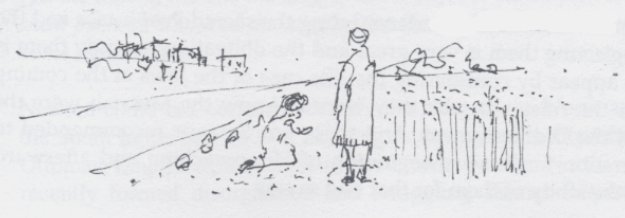This Article: (4 Pages)
- 1. It's not just a story!
- 2. Faithful during trouble
- 3. Boaz as a redeemer
- 4. Ruth, Boaz and Messiah
4) Ruth, Boaz and Messiah
In Ruth 2:10, Ruth humbles herself before Boaz. “She fell on her face and bowed herself to the ground.”She acknowledges her gratitude, as she is a “stranger” and in the position of one who has been called out of the gentiles into the hope of Israel and the gospel. Peter and James clearly state that Yahweh
is taking out of the Gentiles a people for HIS NAME” (Acts 15:14)
who are not manifest at this stage.
Ruth reflects the humility of the faithful. She knelt before Boaz. There are many instances recorded in the scriptures of the faithful kneeling in prayer. Solomon knelt when the Temple was dedicated. Daniel, in Babylon, knelt three times daily, facing Jerusalem as he prayed to Yahweh. Ruth, in her thankfulness, acknowledged Boaz as a manifestation of the Redeemer of Israel.
Who is the Redeemer?
Boaz states that the Redeemer is Yahweh. Boaz tells Ruth it is Yahweh,
“under whose wings thou art come to trust.” (Ruth 2:12)
This analogy refers to the care that Yahweh has for his people. The image is one of warmth, security and protection. It is a refuge. It is an expression repeatedly used by the Psalmist.(Psalm 17:8-9, 36:7, 57:1, 61:4-5, 63:7, 91:4) Yahshua used the same image in Matthew 23:37, when he lamented over Jerusalem,
“O Jerusalem, Jerusalem, thou that killest the prophets and stoned them which are sent unto thee, how often would I have gathered thy children together, even as a hen gathereth her chickens under her wings, and ye would not.”
This is a very sobering point to ponder that the faithful have so often been rejected by those who should have recognised their messages and heeded their warnings.
In Ruth 2:14, Boaz invited Ruth to his table, as one of his household, to partake of the bread and the wine., which are the tokens of sacrifice and dedication. In Genesis 14:18 , Melchizedek offered these to Abram. Yahshua offers these to his followers. We do the same each Sunday in partaking of the bread and the wine at the Messiah’s table.
Here Boaz can be seen in the role of the Messiah as Redeemer. “The part of a kinsman”is one word in the Hebrew, “ga’al”. The word signifies “to redeem”, In other places in scripture this word has been translated as “near kinsman”, “avenger”, “kinsfolk”, “revenger”, “redeemer”, “deliverer” and “ransomed”. Ruth had two near kinsmen, Boaz and the nameless one in Ruth 3:12. They represent the two covenants in scripture. Boaz represents the Abrahamic covenant,of which Yahshua is the Mediator and the nameless one represents the Mosaic covenant.
In Isaiah, as in many places in scripture, Yahweh is revealed as the Redeemer of his people.
Isaiah’s words here reflect the relationship portrayed between Ruth and Boaz.
“Sing O barren, thou that did not bare…For thou shalt break forth on the right hand and on the left; and thy seed shall inherit the gentiles and make the desolate cities to be inhabited…For thy maker is thy husband; Yahweh of hosts is his name; and thy redeemer the Holy One of Israel; The God of the whole earth shall he be called…In a little wrath I hid my face from thee for a moment; but with everlasting kindness will I have mercy on thee, saith Yahweh thy Redeemer.” (Isaiah 54:1-8)
This title “redeemer”, is most frequently used by Isaiah, which is significant as the name Isaiah, in its meaning, is very similar to that of the Messiah; Yah shall save. Israel was, in effect, married to Yahweh and Gentiles who desire to share in the redemptive power of Yahweh, must share also in the Name of Israel's husband, even as Ruth took upon her, through marriage, the name of Boaz.
Boaz, as a figure of the Faithful Israelite, exemplifies his trust in Yahweh in his attitude to his workmen and to Ruth. He acknowledges Yahweh in all his dealings with those in his care. Boaz placed Yahweh at the forefront of their daily doings and not only that, he is placing the Memorial Name of Yahweh on his workers in obedience to the divine command as in Numbers 6:27, manifesting the spirit of the Law. “And they shall put my name upon the children of Israel; and I will bless them”. It is to be through the lineage of Ruth and Boaz, through Yahshua the Redeemer and Messiah that this earth and mankind will be ultimately blessed.
Recall the words of Malachi 3:16, “They that feared Yahweh spake often one to another…a book of remembrance was written before him for them that feared Yahweh and thought upon His Name. “These are the “jewels’ (Mal.3:17), written in the Lamb’s book of life, the purchased, the redeemed.
In the words of the prophet Nathan in 2 Samuel 7:26,
“Let thy Name be magnified for ever.”

For more on Messiah's geneology
Twelve spies, two spies, Rahab & Boaz
It was the team matriarch's 75th Birthday and I thought what can I give? What would be the Greatest Gift to someone we love?
I like sharing interesting things. This article comes from a recollection of my Hebrew teacher from Jerusalem based eTeacher and features the beauty of the Hebrew Language.


This is in response to a question directed to us. Does Isaiah 9:6, which gives the title of a promised king of Israel, calling him 'Wonderful, counsellor, everlasting father, Prince of Peace', show Jesus as God? Firstly we will investigate the context, and who the passage is about. Then we will determine whether it even mentions 'God' in the title of the promised king in the Hebrew text.

Many people have heard of Jesus Christ. Many use 'Christ' as a surname. But it is not a surname, it is a title.

 Show All
Show All


